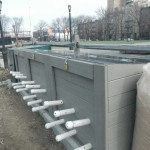
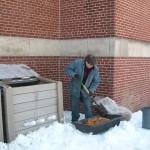
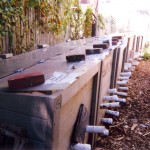

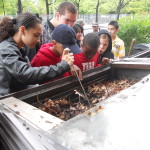
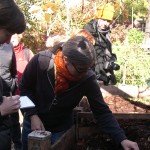
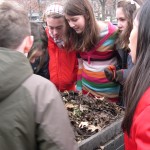


THESE BINS ARE THE BEST I HAVE EVER USED.
Compost is essential for building healthy soil. The Garden of Union hosted a large system (14 ton annually) in cooperation with the Park Slope Food Coop, while Claudia Joseph was the site coordinator from 2005 -2017. She steered the group design process to expanded the system and training instructions as the PSFC rapidly gained members – growing from 5,000 to 16,000 following the building’s expansion. The bins were designed and constructed by Open Road NY. They exclude rats and allow air to vent through the pile, heating the material to 140 – 160 degrees.
In 2001 the system was dysfunctional and the then president Eric Rochow, Compost Coordinator Sherry Showell and Ms Joseph reworked the physical design, team management and garden member participation together.
The compost system was open to all garden members, whether they gardened or not, as well as neighbors and the general public. As an educational model it was visited by Master Composting student groups from each of the 5 boroughs as well as local school groups. An ever evolving team of forty haulers and turners were individually trained as well as each garden member. Because of the system’s success Ms Joseph taught Urban Composting for NYBG for many years.
The Old Stone House partnered with Brooklyn Botanic Garden in 2009 to construct 3 mega-bins at MS 51. We used these for our annual pumpkin smash, for landscape waste and in partnership with restaurants as a study for the MS 51 Science Fair. Cafe Martin supplied buckets of coffee and Rosewater restaurant brought vegetable waste. Classes compared how various materials performed by tracking temperatures, examining the material and exploring the biological life within it.
The Old Stone House and PSFC built 3 extra-sturdy bins in the OSH educational Farm Garden in May 2014. A neighborhood compost club was started in 2016. Volunteers from Brooklyn Botanic Gardens trained neighbors who wanted to participate. Connecting them to the garden had several positive results: more material, more support and great feedback. Thanks to a grant from Citizen’s Committee for NYC and major support from the Park Slope Food Coop, compost is made onsite and continually enriches the gardens . Special thanks to our designer/carpenters Lloyd Hicks and Tom Twente and to Joe Holtz and Phil Collosi at PSFC for making the bins possible.
BASIC RECIPE for COMPOST
Ingredients:
Nitrogen rich material: organic material that is green or wet – *kitchen waste, manure, plants – see caveats*
Carbon rich material: usually brown and dry – leaves, wood (sawdust, shavings, chips)
Moisture: damp but not soaking wet
Air: an oft overlooked element. Aerating with a corkscrew or by turning the material is a quick solution to many problems.
Process
Chop or shred all raw materials.
Mix the brown and green materials together in equal parts. (Many books say 80/20 but you can tinker with the ratio).
If conditions are very dry, add water. Bin will be drier at edges than in the middle and drier on top than on the bottom. Too much water creates anaerobic(airless) conditions that are nasty.
Nitrogen is in all fresh organic material – green leaves, grass, weeds and food scraps. It is present in fresh coffee grounds and manure which are brown.
Carbon rich material includes brown leaves, sawdust, paper and nut husks. Nitrogen moves into the air as green material dries out leaving primarily carbon material behind.
Nitrogen is often referred to as “green” material and carbon as “brown”. This is a general guideline and there are some exceptions. Another way to think of it is that nitrogen is “wet” and carbon is “dry” organic material.
Trouble-shooting Guide
Use additional carbon material, as necessary for odor and insect control.
Bugs = too much nitrogen or a wet condition.
Odor? not enough air – turn the pile or aerate with a corkscrew. Or it could be too much nitrogen material in the mix.
No break-down/no heat? Too much carbon or not chopped enough. May need water.
Whole foods will remain whole for many months. Entry points for bacteria are key to decomposition. The more you chop and turn, the faster decomposition happens.
CAVEATS What not to compost ever:
Anything greasy
Feces of animals that eat meat
Large items that do not break down: Wheat grass mats, flower arrangements, coconut shells, pits
Weedy seed heads of invasive species
Be careful with:
Rice, bread, pasta – do not benefit the system since they are starches. Will cause goo.
Calcium rich egg shells look like litter in the landscape; you can bake and grind them to a powder.
Soil – use it in the landscape not in the bin. A cup of forest soil may used to introduce beneficial microorganisms to your pile.
Although most materials will decompose eventually, in urban systems, omit all meat and eggs. Avocado pits do not break down and can be problematic.
To maintain hygienic systems in urban areas, be cautious and monitor your bin daily.
Turning will speed the decomposition process and help control odor by introducing air into the system.
When you are finished adding material, always cover it with a layer of carbon material so that nitrogen material is not visible. This inhibits both odor and insect activity.
There is often a condition to adjust – observe your system often!
Review: Use an even amount of mixed browns and greens. The more you chop and mix the faster it works. No greasy stuff or starch. Some moisture and air! A square of cardboard on top helps to keep insects away.